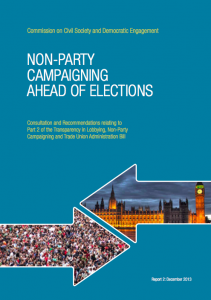Plan to fix the lobbying bill will entrench flaws in election expense rules
 The new report from the Commission on Civil Society and Democratic Engagement makes some valuable recommendations for improving the controversial Transparency in Lobbying, Non-Party Campaigning and Trade Union Administration Bill.
The new report from the Commission on Civil Society and Democratic Engagement makes some valuable recommendations for improving the controversial Transparency in Lobbying, Non-Party Campaigning and Trade Union Administration Bill.
However, two of its proposals – made for understandable reasons – risk entrenching flaws with existing legislation. First, there is the deeply flawed exclusion of staff costs from many existing election expense rules. Back in 2000, just after the then new rules had been introduced, I was working at party HQ and rang the Electoral Commission to confirm that their understanding of the rules they have to supervise was the same as mine and the party’s on the question of staff costs. As I said to them – the law Parliament has passed seems to say that even the staff costs of someone employed with the job title ‘general election planning manager’ were exempt from the general election expense limits. At that was a bit odd, was that their view too or would they be issuing guidance saying something else? The Commission concurred with my view.
The exclusion of such staff costs is deeply flawed. It not only undermines the point of having those national expense limits, it also encourages parties to do more employing of national staff, who are exempted from limits, and less expenditure on the costs incurred by local voluntary activists, which are caught by limits. If our democracy is made better by encouraging parties to prioritise employing more staff in their HQs at the expense of direct support of local voluntary activity, then the rules would be sensible. It’s not, and they’re not.
Given these sorts of staff exemptions (and for simplicity I haven’t covered the cases where staff costs do count towards limits, but they don’t undermine the point about there being a huge loophole), it is understandable that the Commission on Civil Society and Democratic Engagement says voluntary organisations and pressure groups want a staff costs exemption to apply to them too. Understandable – and of course from their perspective a more achievable aim than getting political party staff costs properly included within limits. Yet if they succeed it will entrench this flawed approach to expense limits.
The second problematic proposal has many parallels, for it’s the idea that expenditure which counts against a national spending limit should not also be limited on a constituency basis.
The problem is that – at a general election, for example – we have constituency expense limits and a national limit. However, what parties can and do is bunch up much of their national expenditure so that it occurs disproportionately in their target seats. All legal and above board – and indeed Parliament has turned down frequent opportunities to change this whilst the Electoral Commission over the last decade and more has been aware of the issue and not pushed for the rules to be changed.
So again it’s easy to see why the Commission on Civil Society and Democratic Engagement thinks the national spending by voluntary organisations and pressure groups should also not have its geographic spread constrained.
Again, however, the Commission is arguing for a level playing field with the parties, but the outcome would be to entrench a flaw. Sensible local limits require national activities concentrated in local areas to be covered too. The Commission may be arguing for a level playing field, but it is the wrong field to be using in the first place.
To its credit, the Commission leaves the door open to returning to this second issue at some point in the future, but even so a better solution would be – in both cases – to fix the problems with the law that covers political parties. Or, as a second best, to lock into the legislation an automatic review of those parts shortly after the next election, so that fixing the flaws doesn’t disappear off into the long grass once again.
I’d be happy for both of those issues to be revisited, but only if they are done in parallel with looking at how they work for parties at the same time.
I don’t agree that keeping the level playing field is entrenching a flaw; it’s the only rational way forward. It needs careful attention, and if we change the rules for non-party campaigns now it is highly unlikely that we will be more likely to reform it for parties as well.
I think it is a fair principle in legislation to say that there should be common standards wherever possible. Obviously party and non-party campaigns can’t be treated entirely equally but if we have completely different standards for each then we’ll end up with confusing guidelines, the perception of arbitrariness and a mess of case law, with judges having to pick their way through a mess of contradictions.
It seems to me to be ludicrous that all expenses, including staff costs, are not included in the expenses in the run up to an election